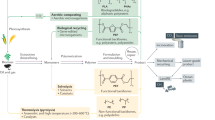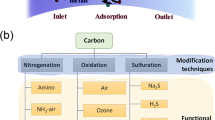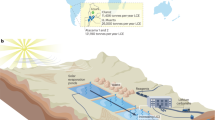Abstract
BRITISH domestic refuse can mainly be divided into ash, cinders, paper, cardboard, glass, metals, plastics and organic matter1,2. The relative amounts of each component have varied over the years: ash and cinders have decreased while paper, cardboard, glass, metals and plastics have increased, because of their widespread use in ‘throwaway’ packaging.
This is a preview of subscription content, access via your institution
Access options
Subscribe to this journal
Receive 51 print issues and online access
$199.00 per year
only $3.90 per issue
Buy this article
- Purchase on Springer Link
- Instant access to full article PDF
Prices may be subject to local taxes which are calculated during checkout
Similar content being viewed by others
References
Tinker, J., New Scient. 54, 389–390 (1972).
Patterson, W., and Searle, G., Packaging in Britain: a policy for containment (Friends of the Earth, Ltd, 1973).
Rolfe, T. J. K., Mon. Bull. Br. Coal Util. Res. Ass., 33, (2), 28–31 (1969).
Cheater, G., Publ. Cleans., 60, (4)187–199 (1970).
Staudinger, J. J. P., Disposal of plastics waste and litter, Monograph No. 35 (Society of Chemical Industry, 1970).
Mack, W., First Nat. Conf. Composting—Waste Recycling, 28–30 (Rodale Press, 1971).
Eggins, H. O. W., and Mills, J., United Nations Industrial Development organisation, publication No. 1D/WG.96/4, 1–40 (1971).
Mills, J., Barnes, T. G., and Eggins, H. O. W., Int. Biodeterior. Bull., 7, 105–108 (1971).
Mills, J., thesis, University of Aston in Birmingham (1973).
Hughes, D. E., Ind. Recovery (1969).
Eggins, H. O. W., Mills, J., Holt, A., and Scott, G., Microbial Aspects of Pollution, 269–279 (Academic Press, 1971).
Lewin, R., New Scient., 49, 440–441 (1971).
Scott, G., New Scient., 47, 293 (1970); Chem. Br., 9, 267–272 (1973).
Whittaker, D., and Forsyth, J. S. A., Br. Patent, 581,279 (1946).
Beachell, H. C., and Nemphos, S. P., J. polym. Sci., 21, 113–124 (1956).
Alter, H., Ind. Engng. Chem., 52, 121–124 (1960).
Mills, J., and Eggins, H. O. W., Int. Biodeterior. Bull. 6, 13–17 (1970).
Eggins, H. O. W., and Pugh, G. J. F., Nature, 193, 94–95 (1962).
Metcalfe, L. D., and Schmitz, A. A., Analyt. Chem., 33, 363–364 (1964).
Khosrovi, B., thesis Univ. Manchester Inst. Science and Technology (1969).
Roberts, R. B., Cowie, D. B., Abelson, P. H., Bolton, E. T., and Britten, R. J., Studies of biosynthesis of Escherichia coli, 13–20 (Carnegie Institution, Washington DC, 1955).
Goodwin, T. W., and Morton, R. A., Biochem. J., 40, 628–640 (1946).
Documenta Geigy—Scientific Tables (edit. by Diem, K., and Lentner, C.) seventh ed., 516 (J. R. Geigy, S.A., Basle, Switzerland, 1970).
Author information
Authors and Affiliations
Rights and permissions
About this article
Cite this article
BROWN, B., MILLS, J. & HULSE, J. Chemical and biological degradation of waste plastics. Nature 250, 161–163 (1974). https://doi.org/10.1038/250161a0
Received:
Issue Date:
DOI: https://doi.org/10.1038/250161a0
This article is cited by
-
Enhancing polyethylene degradation: a novel bioprocess approach using Acinetobacter nosocomialis pseudo-resting cells
Applied Microbiology and Biotechnology (2024)
-
Influence of ultraviolet and chemical treatment on the biodegradation of low-density polyethylene and high-density polyethylene by Cephalosporium strain
Environmental Monitoring and Assessment (2023)
-
Influence of nitric acid on biodegradation of polystyrene and low-density polyethylene by Cephalosporium species
Archives of Microbiology (2022)
-
Gas-Sensing Properties and Preparation of Waste Mask Fibers/ZnS Composites
Journal of Electronic Materials (2022)
-
De-polymerization of LDPE plastic by Penicillium simplicissimum isolated from municipality garbage plastic and identified by ITSs locus of rDNA
Vegetos (2021)
Comments
By submitting a comment you agree to abide by our Terms and Community Guidelines. If you find something abusive or that does not comply with our terms or guidelines please flag it as inappropriate.



